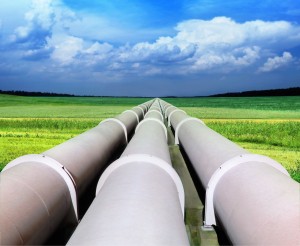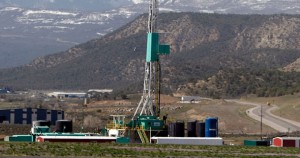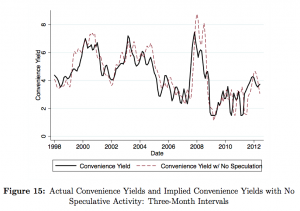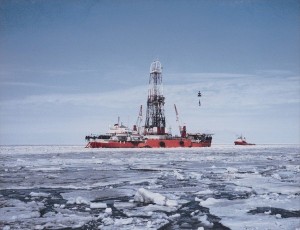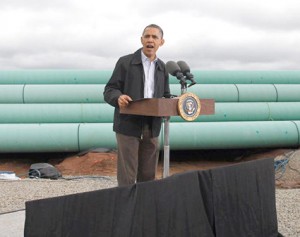94 item(s) were returned.
A report, “Fuel Choice for American Prosperity,” recently published by the United States Energy Security Council (USESC), a group within the Institute for the Analysis of Global Security (IAGS), identifies challenges facing the United States’ pursuit of energy security. Despite oil imports expected to fall to their lowest level since 1987 (EIA), the total amount of money the U.S. spends on oil imports has increased. If energy security is defined as “reliable supply at an affordable price,” as the report’s authors define, the U.S. has improved the former, but failed to impact global oil prices, which have risen more than… [more]
View InsightDirector, Stakeholder Relations/External Affairs
Brookhaven National Laboratory
Keystone XL has been called the world’s best known pipeline that has not been built. Controversy over the pipeline itself has largely subsided but this project linking the oil sands of Northern Alberta to the large refineries of the Gulf Coast has become a rallying point for an “off oil” campaign. A presidential permit for import facilities is the sole remaining requirement before construction can begin. KXL would be the 82nd major pipeline in the US, and is the safest and most technologically advanced. It would provide diluted bitumen from Alberta’s oil sands and Bakken crude from Montana and North Dakota to… [more]
View InsightLegislative Director
Congressman Matt Cartwright
The Resource Conservation and Recovery Act (RCRA) of 1976 requires the safe disposal of solid waste and hazardous materials. In 1980, RCRA was amended to exempt waste from the production and development of oil and natural gas (E&P waste). In 1988, the EPA issued a Regulatory Determination further exempting oil and natural gas producers from RCRA’s most stringent safety requirements. This left the task of regulating disposal of these wastes to states, which they have done to varying degrees. Recent reports show the extent of the problem and highlight the potentially fatal consequences. The regulatory determination was issued before fracking,… [more]
View InsightThe crude oil price spikes and high fuel costs experienced in the U.S. over the past ten years have encouraged many attempts to identify the underlying causes of these trends. Diminishing oil resources, slowing rates and increasing costs of production, financial speculation and geopolitics are all common arguments used to explain the recent volatile price changes in oil. But is there a correct answer? According to a recent MIT study, one theory can be ruled out: financial speculation. “We show speculation had little, if any, effect on prices and volatility,” and may have even decreased prices, wrote the authors of… [more]
View InsightAccording to a recently released Harvard Law School report, the website FracFocus.org “fails as a regulatory compliance tool” for energy companies developing oil and gas wells using hydraulic fracturing. FracFocus, an online national hydraulic fracturing chemical registry managed by the Ground Water Protection Council and Interstate Oil and Gas Compact Commission, was established to provide the public with access to reported chemicals used for hydraulic fracturing within their area. Currently 11 of the 18 states that require disclosure of hydraulic fracturing chemicals allow companies to use FracFocus as their reporting method. FracFocus was also proposed by the Bureau of Land… [more]
View InsightThe increased focus on oil and gas exploration in the Arctic has identified numerous issues. Oil and gas exploration is a significant challenge for policy makers at all levels of government. In the recent Review of Shell’s 2012 Alaska Offshore Oil and Gas Exploration Program, the Department of Interior identified seven critical principles for safe and responsible offshore drilling, including improved management of contractors and integrated government oversight. It has been noted that with the substantial oil and gas resources believed to exist in the Arctic, geopolitical considerations will greatly impact domestic policy. A Center for Climate and Energy Solutions… [more]
View InsightPresident
Micro-Utilities, Inc.
Are the United States and other countries facing a looming threat of another oil-related recession? Prior to the economic crash in 2008 the price of oil steadily increased. As the world margin between supply and world demand approached zero, oil prices rose. When this margin went to zero, oil prices hit $147/barrel and the recession began. Unlike many politically initiated oil recessions of the past, a major recession trigger in 2008 was a “physically” initiated event — the disappearance of the margin between world supply and demand. Physically initiated oil recessions do not have the post-peak, national, debt-free “stimulus package”… [more]
View InsightLast week Senator Lisa Murkowski (R-AK), the senior Republican on the Senate Energy and Natural Resources Committee, published a blueprint for energy policy, titled “Energy 20/20: A Vision for America’s Energy Future.” The blueprint offers ideas to “align federal policy with… our national interest to make energy abundant, affordable, clean, diverse, and secure.” Among the main ideas in Sen. Murkowski’s blueprint are: Establishing a national goal to become independent of OPEC imports by 2020 by increasing domestic oil, biofuel and synthetic fuel production. Approving the Keystone XL pipeline. Opening the Arctic National Wildlife Refuge to oil and gas drilling and… [more]
View InsightUniversity Distinguished Professor
Michigan State University, Dept. of Chemical Engineering
The last century can rightly be called the Age of (Inexpensive or ‘Cheap’) Oil as world oil consumption grew from about 20 million tons per year in 1900 to just under 400 million tons per year in 2005. Since 2005, however, world oil consumption has been nearly constant despite high demand and record high oil prices, which indicates that we simply cannot produce oil any faster. And since oil is not renewable, eventually the production (and therefore the consumption) of oil must decline. Declining oil production will be an extremely painful reality for the U.S. because not only does the… [more]
View InsightLast week Governor Dave Heineman of Nebraska approved the Keystone XL pipeline along a revised route, “which avoids the environmentally-sensitive Sand Hills region of Nebraska.” The final decision now rests in the hands of President Obama, who last year rejected the previous route on grounds that construction of the pipeline and the possibility of a spill could contaminate the Ogallala Aquifer in the Sand Hills region. For many environmentalists and opponents of the Keystone XL project, however, this revised route doesn’t address the bigger climate argument: Due to the high level of greenhouse gasses emitted during production of oil from… [more]
View Insight
